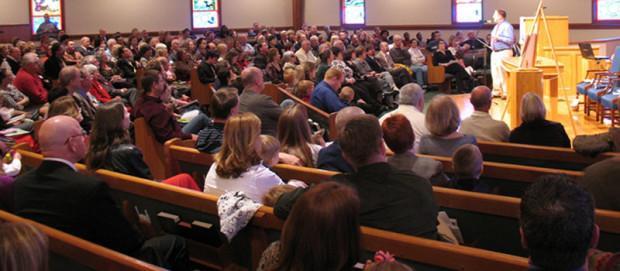Pastors Discuss: 7 Easy Steps to Establish & Grow Your Church

In The Beginning….
(Genesis 1:1)
It started out small; just an idea; a few informal meetings of people with similar beliefs in God. You met and exchanged ideas, you built a fellowship, people made these informal meetings part of their routine and eventually word spread; others joined; you grew.
Now you have a flock and it’s time to give it a home. Organizing your make-shift congregation into a legally recognized church requires that you take some steps to make this happen; not for God, but for Uncle Sam. You must become legally recognized to take advantage of government church protections and privileges.
Like any new organization, the omnipresent IRS has some specific and typically baffling guidelines for what the agency would consider a ‘church.’ The IRS website offers a cumbersome Church Tax Guide and certainly you should consult with a qualified accountant as you become ‘legal’ but there are some basic things you need to do in order to get the process started.
A good name is rather to be chosen than great riches
(Proverbs 22:1)
You will need to choose an available name. This allows all government agencies, potential vendors, and donors to recognize you. Research IRS websites and perform an inexpensive name search online to verify that your Official Church Name is unique to your congregation.
You will need to solidify the members of your Church Board, the decision making body. If your congregation is denominational, contact your denominational headquarters and solidify the support of the headquarters. Then it is time to set up a PO Box so you can start dealing with the government.
Let every person be subject to the governing authorities.
(Romans 13:1)
Next you will need to incorporate within your state’s Corporation Commission. Each state is different but some things are universally required. You will need to include your non-profit wording request for organization and clearly identify your Board responsibilities and members. Check with the IRS to see that your non-profit wording is within Uncle Sam’s guidelines as well.
Contact your Secretary of State to get all the necessary state organizational documents. Many new congregations do not realize upon the first visit to the SOS office that, like any organization, you need to have a clear dissolution clause in the event your Church ceases to function.
The laborer deserves his wages
(1 Timothy 5:18)
Whether you are going to have a paid clergy or not, the IRS requires that you apply for an Employer Identification Number (EIN). Simply put, this is a tax identification number, and is how the IRS will refer to you for the rest of this process. It is like the Social Security Number for your organization. You can apply for this number for free on the IRS website. You must then check with your state to clarify whether a state tax ID number is also required, and apply for it.
You are going to want to take advantage of the tax allowances and breaks provided to churches with a 501(C)3 non-profit status, but before you can ever apply for this desired church tax status, you must have your EIN number.
For where two or three are gathered in my name, there am I among them
(Matthew 18:20)
It is time to convene the Board of Directors meeting. There are several key things which must be decided. You must adopt by-laws, elect officers, adopt IRS and state required policies and authorize opening a bank account. Expect arguments and heated discussions but remain steadfast to finding solutions.
You must also determine terms for the selection and expulsion of Board members. The IRS requires that you have at least one annual meeting, so agree when this will happen. How will the purchase and conveyance of property be handled?
If you will have paid clergy, determine salaries or benefits. When issues arise, how will the Board be contacted to convene? Who has voting rights and what will be considered a quorum? What are the responsibilities of the directors, how do you amend the by-laws? What will be your source of revenue – fundraising, donations, or perhaps operating a business.
This will not be an easy meeting to have, but a church is a fellowship, so finding common ground and compromise will be essential. As in the days of Solomon, it may be wise to appoint a mediator – someone who is not on the Board – to help broker compromises and settle disputes.
Pay to all what is owed to them: taxes to whom taxes are owed, revenue to whom revenue is owed
(Romans 13:7)
Once you have established written operational guidelines, you are now ready to face Uncle Sam and request your 501(c)3 status. This is the status that will keep the IRS out of your church coffers. The government has very specific rules on how you can be defined as a 501(c)3 and how you can maintain this status. It is important that you understand these rules. You should have your operational guidelines checked by an attorney or an accountant to ensure that they will hold up to the IRS’s protocols.
The IRS will require that you submit a copy of your by-laws and business structure for approval. You should be prepared to wait. It often takes 12-18 months for the IRS to approve or deny your application. Don’t lose hope on your approval because of a long wait time – the government moves painfully slow – especially when it is granting an organization the privilege of not paying taxes.
You may also be exempt from paying state taxes. You will need to duplicate this process at the state level. Your Federal tax exempt status DOES NOT automatically qualify you for state tax exemption, you must apply with your state and perhaps even county or city to avoid taxation at the local levels.
In the meantime, begin operating under your by-laws and manage all finances to the penny.
Each of you is to put something aside and store it up, as he may prosper
(1 Corinthians 16:2)
The IRS as well as your congregation is going to require that you maintain good financial records so you must open a bank account. Your by-laws should have established safe-guards for spending and dispersing money.
There are benefits to opening an account with your 501(c)3 status, however, it is not necessary to wait for your status to be approved to open your account. You can and should open a regular account immediately and notify the bank that you will be converting this account in the future, once you have your status.
Some banks will begin a good-faith relationship and begin to give you some of the ‘perks’ of a non-profit ahead of time – such as free checks, no check writing charges, free debit card purchases and other reduced business banking charges.
Then render to Caesar the things that are Caesar’s, and to God the things that are God’s
(Luke 20:25)
Once you have your 501(c)3 determination letter, you may now apply for a sales tax exemption. You should hold off on making any large purchases until you have this exemption because it will save you a considerable amount of money. The government is not going to give you a refund on taxes you have already paid so anything that is taxed before you are officially exempt is money you will never recoup.
Prepare your work outside; get everything ready for yourself in the field, and after that build your house
(Proverbs 24:27)
Once you have your exempt status, you should now feel empowered to buy your land and begin building your steel church building, the place you will call home. As far as Uncle Sam is concerned, you are now a legal church.
Choosing a steel building church can give you the maximum return on the congregation’s minimal investment. Pre-engineered steel church buildings reduce your investment when compared to conventional construction.
At Armstrong Steel, we offer fully customizable steel church buildings to accommodate worship needs and at a price any community can afford.
To start planning, call 800-345-4610 or check out our complete guide on steel building systems so we can begin your quote and discuss options.
« Cash Flow Strategy For Contractors
Commercial Construction Projected to Rise 17% in 2014 »
Popular Posts

If you’re a committed member of your religious community, chances are you have heard about a growing trend in the industry: the multi-site church. What exactly is that? Usually, there exists one main church campus with several satellite locations. Different sites can be in the same city, or across the country. Multi-site churches are becoming… …

Metal buildings are the most durable type of structure in the industry. They hold up against inclement weather, strong winds, heavy snowfall, and earthquakes. They even can combat fire, mold, and pesky insects like termites. In fact, they are engineered for your specific area. You’re probably thinking,“yeah, yeah, but quality like that isn’t cheap.” This… …

